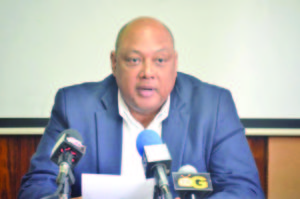Following passage in the National Assembly last month, the Witness Protection Act is now in full effect after being assented to by President David Granger. This legislation is geared to safeguard persons – who have information on and/or are witnesses to criminal activity – from violent retaliation or persecution from the offending party. According to information reaching Guyana Times International, the Head of State assented to the legislation on February 12, some three weeks after it was passed.
One of the key provisions under the Act is for the establishment of a Witness Protection Programme, wherein persons can be protected while they are attending court. Additionally, it was outlined that such witnesses can obtain new identities. The law also allows for Judges and Magistrates to be informed in chambers about “relevant information” relating to the witnesses. However, those judicial officers are prohibited from disclosing this information. Added to that, during criminal proceedings, parts that relate the witnesses’ identity may be held in camera.

It was outlined that an administrative centre will be responsible for the register of persons under the Witness Protection Programme. This Centre will handle identity changes and it can withdraw this protection and restore the identity of the former participant, in which case he or she is allowed 28 days to apply to the President of Guyana for a review of the centre’s decision.
Some offences under which witnesses could seek protection are murder, manslaughter, treason, sedition, piracy or hijacking, gun-related crimes, trafficking, sexual and domestic violence related offences and offences under the Anti-Money Laundering and Countering the Financing of Terrorism and Anti-Terrorism laws.
Part VI of the Act prevents anyone, including participants or former participants, from disclosing information in relation to the programme. The penalty for breaching this provision is a G$1 million fine and 10 years in prison. According to Section 20 (1), this law applies to anyone who, without lawful authority, reveals information about the identity or location of someone who had participated in the witness protection programme which can compromise that person’s safety.
Section 20 (2) stipulates that someone who had undergone assessment to be considered for inclusion in the programme is barred from revealing their participation.
When the Witness Protection Bill was debated in the National Assembly earlier this year, Opposition parliamentarian Odinga Lumumba had questioned if there were provisions to fund the relocated witnesses, or to facilitate the integration of juvenile participants of the programme into the school system. Lumumba based his argument on the belief that Guyana does not have the capacity to support the bill’s provisions.
However, Natural Resources Minister Raphael Trotman while acknowledging the concerns had countered that with the impending oil industry, new threats would arise and the Government could not wait. At that time, Trotman noted cross-referenced witness protection programmes in the United States and other jurisdictions.
The original bill was drafted under the former Administration since 2006 but when it came up for discussion in the House after some 11 years, Opposition Chief Whip Gail Teixeira had contended that it came back with little to no changes and that it was another work of “copy and paste”.
The Police have for years complained about difficulties they experience with regard to certain crimes, owing to the lack of witnesses. Some have posited that crimes are recorded as unsolved or remain a mystery possibly because witnesses are not brave enough to testify, or they are afraid of being held accountable for someone’s sentencing.



